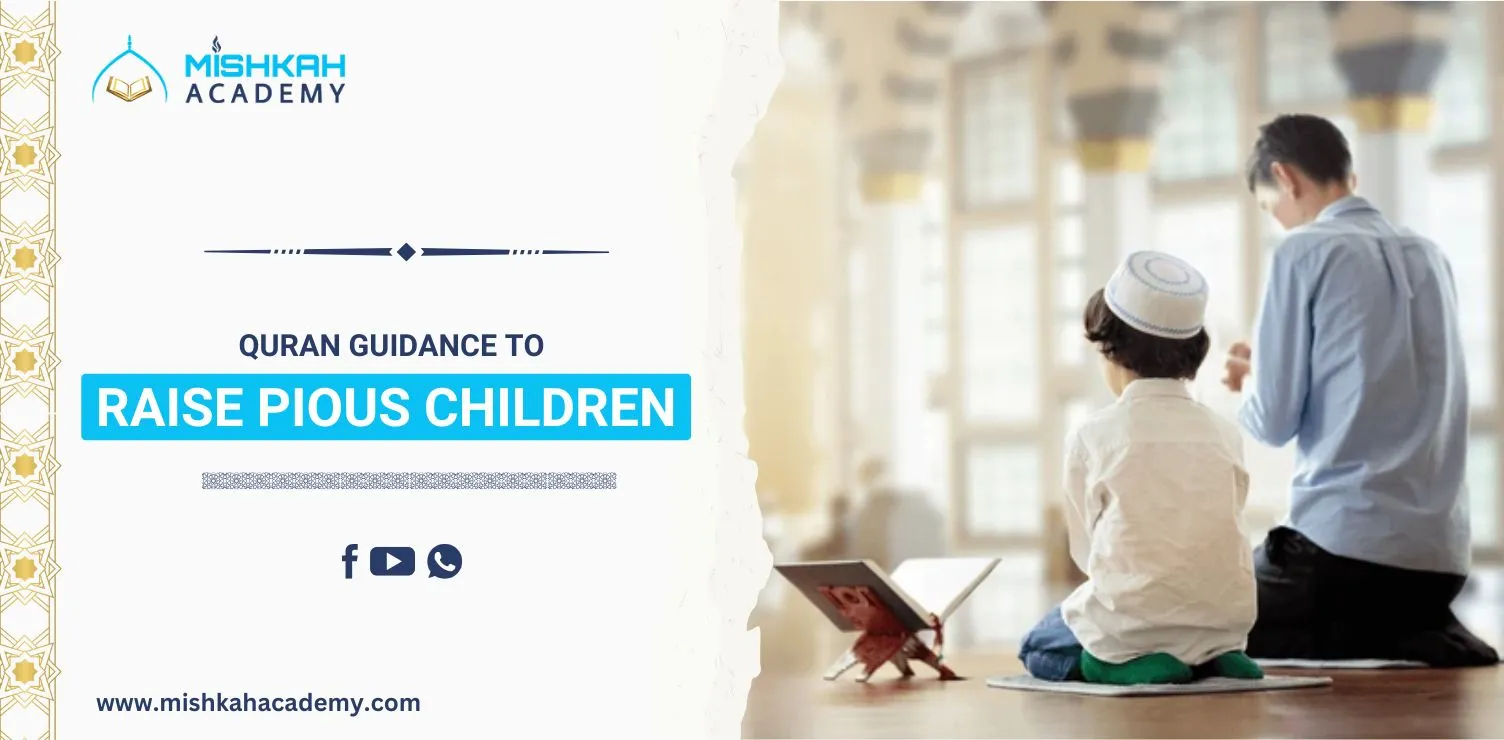The Quran is the ultimate guide for parents seeking to raise pious children. It provides clear teachings and examples to nurture strong faith, good character, and moral values in young hearts. Parents can find valuable lessons in the Quran about instilling Tawheed, encouraging prayer, practicing patience, and leading with kindness.
10 Ways learning Quran help Parents raise Pious Kids
Table of Contents
ToggleHere are some ways shared by Mishkah Academy Quran tutors on how quran guides the parents to raise pious kids.
1. Teach About Tawheed as the Foundation of Islam
To teach Tawheed, start by explaining to your child that Allah is the only Creator and Sustainer of everything. Use simple examples like the sky, trees, and animals to show Allah’s power. Recite and discuss Surah Al-Ikhlas:
“Say, ‘He is Allah, [Who is] One. Allah, the Eternal Refuge.’” (Quran 112:1-2)
Tell them Allah alone deserves worship and reliance. Avoid confusing terms; keep it simple. Repeat this message during daily tasks like mealtimes or bedtime. Encourage them to say, “Alhamdulillah” and “SubhanAllah” often. Practice sincerity in worshiping yourself to set an example. Islamic studies for kids are the best option for children to teach them about Islam properly.
2. Share Quranic Stories About the Prophets and Early Islam
Storytelling captures a child’s attention while teaching valuable lessons. Share stories from the Quran, like the ones listed below:
| Story | Lesson | Quran Reference |
| Prophet Ibrahim’s faith | Trust Allah during difficulties | Surah Al-Anbiya (21:69) |
| Prophet Yusuf’s patience | Be patient and forgive others | Surah Yusuf (12:100) |
| Prophet Musa’s bravery | Stand firm in your faith | Surah Taha (20:77-78) |
| Prophet Muhammad (PBUH)’S kindness | Treat others kindly | Surah Al-Ahzab (33:21) |
Read these stories aloud and explain their lessons using simple words. Ask questions to involve your child in the discussion.
3. Practice Kindness and Patience Daily
Teaching kindness and patience develops a child’s character. Show kindness through your actions, like sharing, apologizing, or helping others. Explain how patience pleases Allah, especially during hardships. Mention the ayah:
“Indeed, Allah is with the patient.” (Quran 2:153)
Encourage your child to practice patience in small things, like waiting for their turn or staying calm when upset. Praise their efforts with kind words. Create a reward system for acts of kindness, such as helping siblings or sharing toys. Let them see you model patience during tough times to inspire them.
4. Recite Quranic Duas with Them from an Early Age
Start teaching simple duas related to daily life. For example:
“رَبِّ زِدْنِي عِلْمًا”
(Rabbi zidni ilma) – “My Lord, increase me in knowledge.” (Quran 20:114)
“رَبَّنَا آتِنَا فِي الدُّنْيَا حَسَنَةً”
(Rabbana atina fid-dunya hasanah) – “Our Lord, give us in this world good.” (Quran 2:201)
Recite these duas during activities like studying or meal times. Repeat them slowly and ask your child to follow along. Use visual aids, like flashcards, to help them memorize. Practice together daily, making it a bonding moment. If your kids are enrolled in a quran recitation course then make it a habit to recite these duas before starting quran recitation.
Start Kids Quran Learning Journey Today5. Lead Your Child by an Example
Children learn from what they see, not just what they hear. Show them how to live according to Islam through your actions. Pray Salah on time and involve them in simple acts of worship. For example, say “Bismillah” before eating and “Alhamdulillah” after finishing. Avoid negative behaviors like shouting or lying, as children may imitate these.
Be honest and kind in your interactions with others. If you make a mistake, admit it and seek forgiveness. This teaches humility. When they see your consistent dedication to faith and good manners, they will naturally follow your example.
6. Follow Prophet Muhammad (PBUH) Way of Raising the Child
Prophet Muhammad (PBUH) was gentle and loving with children. He played with them, called them affectionate names, and corrected mistakes kindly. For example, he said to a child,
“O boy! Mention the Name of Allah and eat with your right hand, and eat of the dish what is nearer to you“ (Sahih Bukhari)
He also encouraged children’s participation in worship, like allowing his grandchildren to sit on his back during prostration. Teach children gradually, keeping their age in mind. Follow his practice of rewarding good behavior. Narrate these incidents to your child, explaining the importance of kindness and good manners. This way, they’ll learn from his example and grow up with a strong moral foundation. Enroll your children in quran classes for kids so that at a young age they can learn and understand Islam properly.
7. Instill the Importance of Salah and Worship Around 7 Years Old
The Prophet (PBUH) said,
“Command your children to pray when they become seven years old, and beat them for it (prayer) when they become ten years old; and arrange their beds (to sleep) separately.” (Sunan Abi Dawud 495).
At this age, a child is mature enough to understand its importance. Explain that Salah is a connection with Allah and a way to seek His blessings. Start with teaching them Surah Al-Fatiha and simple duas for prayer.
Set a specific time for family prayer so they see it as a routine. Praise them when they pray on time and gently remind them if they forget. This instills discipline and love for worship early on, making them committed to Salah throughout their life.
8. Encourage Obedience to Parents with Love
The Quran emphasizes obedience to parents:
“And We have enjoined upon man [care] for his parents…” (Quran 31:14).
To encourage obedience, avoid harsh commands. Use gentle words and explain the reason behind your instructions. For example, instead of saying “Clean your room now,” say, “Allah loves cleanliness, so let’s keep your room tidy.” Involve them in decision-making to make them feel valued. Praise and reward their efforts when they listen. Narrate the Quranic story of Prophet Ismail (AS), who obeyed his father even in a great trial.
9. Ensure a Halal and Pure Environment
Creating a halal and pure environment shapes a child’s faith and character. The Quran says:
“O mankind, eat from whatever is on earth [that is] lawful and good…” (Quran 2:168).
Feed your child only halal food, avoiding anything doubtful. Monitor what they watch and the company they keep. Replace harmful influences with Quranic stories, Islamic books, and good friends. Keep your home free of negativity, such as arguments or gossip. Explain to your child why certain things are forbidden, connecting it to Allah’s commands.
10. Emphasize Accountability Before Allah’s Judgment
Teach your child that every action is recorded and judged by Allah. The Quran states:
“So whoever does an atom’s weight of good will see it.” (Quran 99:7).
Make this concept relatable. For instance, say, “When we share, Allah sees our kindness.” Use examples from their daily life, like helping a sibling or being honest. Encourage them to seek forgiveness for mistakes and aim to improve. Reward good deeds to reinforce accountability. Teach them about Allah’s mercy, so they feel hopeful, not scared.
What Does the Quran Say About Raising Children?
The Quran emphasizes the spiritual upbringing of children. In Surah At-Tur, Allah says:
“And those who believe and whose descendants follow them in faith – We will join with them their descendants, and We will not deprive them of [anything] of their deeds.” (Quran 52:21).
This highlights the importance of nurturing children’s faith so they can follow the righteous path. Parents are encouraged to instill belief in Allah, teach good character, foster a love for Islamic values, and teach quran to kids.
How to Raise Righteous Children in Islam?
Raising righteous children requires a focus on faith, character, and environment. Parents should teach children the love of Allah, the Prophet Muhammad (PBUH), and the Quran. This can be done through storytelling, daily sunnah practices, and encouraging good deeds. The Prophet’s virtues, like honesty and kindness, should be demonstrated in everyday life.
Parents must also shield their children from bad influences by ensuring they have righteous companions and a halal environment. Encouraging Salah and recitation of the Quran regularly will further strengthen their connection to Islam.
What are the Stages of Child Upbringing in Islam?
The Prophet Muhammad (PBUH) outlined three key stages of parenting:
- 0-7 years: Play with your children and build a loving bond.
- 7-14 years: Teach them faith, Salah, and Islamic values.
- 14-21 years: Guide and advise them as friends, respecting their growing independence.
These stages focus on gradual teaching while respecting the child’s emotional and intellectual growth. Parents should nurture their child’s faith, instill good character, and teach responsibility at the right age.
Conclusion
According to the Quran, raising pious children requires dedication, love, and a strong focus on Islamic teachings. Parents play a crucial role in instilling faith, values, and good character from an early age.
Mishkah Academy is a pioneer in this mission, offering expert guidance with experienced tutors who have helped families for years. Their structured programs ensure children learn Quranic values effectively, laying a strong foundation for faith and success.
Start Kids Quran Learning Journey Today





